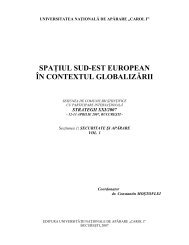PROVOCĂRI LA ADRESA SECURITĂŢII ŞI STRATEGIEI LA ÎNCEPUTUL SECOLULUI XXI
provocări la adresa securităţii şi strategiei la începutul secolului xxi
provocări la adresa securităţii şi strategiei la începutul secolului xxi
You also want an ePaper? Increase the reach of your titles
YUMPU automatically turns print PDFs into web optimized ePapers that Google loves.
einforce and unite its existing neighbourhood policy towards these regions<br />
around two overarching objectives for the next decade or longer:<br />
– To work with the partners to reduce poverty and create an area of<br />
shared prosperity and values based on deeper economic integration,<br />
intensified political and cultural relations, enhanced cross-border<br />
cooperation and shared responsibility for conflict prevention between the<br />
EU and its neighbours.<br />
– To anchor the EU’s offer of concrete benefits and preferential<br />
relations within a differentiated framework which responds to progress<br />
made by the partner countries in political and economic reform.<br />
The EU and the partner countries have a common interest in<br />
ensuring the new external border is not a barrier to trade, social and<br />
cultural interchange or regional cooperation. The impact of ageing and<br />
demographic decline, globalization and specialization means the EU and its<br />
neighbours can profit from putting in place mechanisms that allow workers<br />
to move from one territory to another where skills are needed most –<br />
although the free movement of people and labour remains the long-term<br />
objective.<br />
Cooperation, joint work and assistance to combat security threats<br />
such as terrorism and trans-national organised crime, customs and taxation<br />
fraud, nuclear and environmental hazards and communicable diseases<br />
should be prioritised. Both domestic measures and intensified bilateral and<br />
multilateral action are indispensable to fight organised crime. Particular<br />
attention should be paid to drugs trafficking, trafficking in human beings,<br />
smuggling of migrants, fraud, counterfeiting, money laundering and<br />
corruption. The EU should explore the possibilities for working ever more<br />
closely with the neighbouring countries on judicial and police cooperation<br />
and the development of mutual legal assistance.<br />
Shared values, strong democratic institutions and a common<br />
understanding of the need to institutionalise respect for human rights will<br />
open the way for closer and more open dialogue on the Union’s Common<br />
Foreign and Security Policy (CFSP) and the development of the European<br />
Security and Defence Policy (ESDP). A shared neighbourhood implies<br />
burden-sharing and joint responsibility for addressing the threats to stability<br />
created by conflict and insecurity.<br />
Shared values and mutual understanding provide the foundations<br />
for, inter alia, deeper political relations, enhanced cooperation on justice and<br />
security issues, environmental improvement and governance. The<br />
importance of dialogue between civilisations and the free exchange of ideas<br />
between cultures, religions, traditions and human links cannot be<br />
overemphasised. The EU should contribute to the development of a<br />
flourishing civil society to promote basic liberties such as freedom of<br />
expression and association. The EU also needs to make a greater effort to<br />
create a positive image in the neighbourhood and act to combat stereotypes<br />
which affect perceptions of the neighbouring countries within the EU.<br />
Full integration into EU markets and society requires compatible<br />
and interconnected infrastructure and networks as well as harmonised<br />
regulatory environments. EU policies such as Trans-European Networks<br />
(TENs), Galileo and other research activities should draw up strategies for<br />
the Eastern and Southern neighbours.<br />
A stronger and more stable climate for domestic and foreign<br />
investment is critical to reducing the wealth gap that exists between the EU<br />
and its neighbours. Foreign investment can encourage reform and improved<br />
governance at the same time as contributing to the transfer of know-how and<br />
management techniques and the training of local personnel.<br />
The Western Balkans is gradually leaving behind the bloody<br />
conflicts of the nineties. Important steps have been made in terms of<br />
political and economic reform. The heritage of this recent past and ensuring<br />
there will be no return to it, is still a major challenge for the region. For<br />
most of the Western Balkans, the road to the fulfilment of the political and<br />
economic criteria for accession seems quite long. Capacity to live in peace<br />
with neighbours and among ethnic communities, and combat against<br />
organised crime and corruption are key tasks. The Union supports politically<br />
and financially the reform efforts and the European aspirations of the<br />
Western Balkan countries. It is also playing an increasing role in<br />
peacekeeping operations in the area [10].<br />
I. Relations between the European Union and Russia<br />
Russia’s border with the EU will almost double in length. A new<br />
neighbourhood policy will only constitute one pillar of the overall<br />
EU/Russia strategic partnership [11]. In the context of a new EU<br />
neighbourhood policy, new initiatives to encourage regional cooperation<br />
between Russia and the countries of the Western NIS might also be<br />
considered.<br />
The Partnership and Cooperation Agreements set, in broad terms,<br />
an agenda for legislative and regulatory approximation, albeit without fixed<br />
deadlines. For the WNIS, this agenda could be developed as currently<br />
explored in the Common European Economic Space (CEES) initiative<br />
launched with Russia. The CEES itself should be developed to set out a<br />
deeper and broader timetable for legislative approximation between the EU<br />
and Russia. Participation in selected EU activities and programmes,<br />
307<br />
308




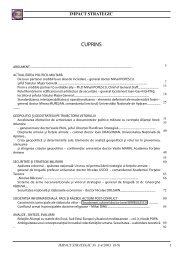
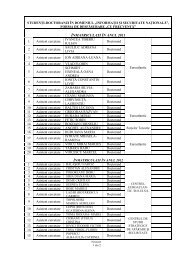
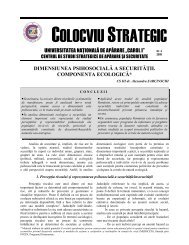
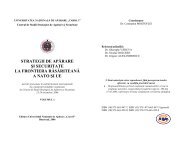

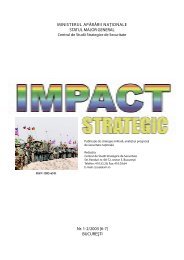



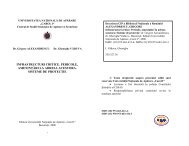
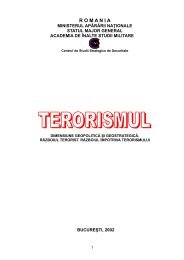

![„CAROL Nr 4 [29]/2008](https://img.yumpu.com/53801719/1/184x260/carol-nr-4-29-2008.jpg?quality=85)
